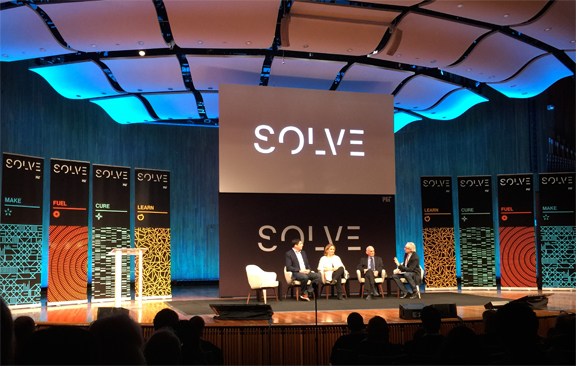MIT – Collaborative Intelligence Initiatives
Massachusetts Institute of Technology (MIT) is rapidly developing a range of initiatives that require transdisciplinary collaboration.
 MIT Press recruited Amy Brand from Harvard to be its new Director. Her PhD in Cognitive Science makes her well-suited to spearhead MIT Press leadership of digital publishing, which complements other collaborative initiatives at MIT.
MIT Press recruited Amy Brand from Harvard to be its new Director. Her PhD in Cognitive Science makes her well-suited to spearhead MIT Press leadership of digital publishing, which complements other collaborative initiatives at MIT.
In October 2015 MIT launched a big idea called SOLVE, bringing together thought leaders to focus on transdisciplinary challenges. One goal of SOLVE is to bridge the thought into action gap by engaging thought and action leaders in solving global challenges. Diverse MIT Press books support the SOLVE initiative.
In his short tenure as President of MIT, L. Rafael Reif has made MIT a global leader. He launched his Presidency by outlining the threats and opportunities presented by the sudden rise of credible, low-cost online learning alternatives. He challenged MIT to use the campus as a lab to explore the future of higher education. The rapid growth of MIT’s non-profit online learning platform edX engaged more than 2.2 million learners from 196 countries in its first two years, supported by an Institute-wide Task Force on the Future of MIT Education.
Dr. Reif opened the SOLVE colloquium. Chris Shipley was recruited to be Executive Producer of SOLVE, which is managed by the Technology Review. She brings her experience as executive producer of the DEMO conference in Silicon Valley from 1996 to 2009, through which she helped more than 1,500 companies make their market debut, companies whose combined market value is more than $60 Billion. At MIT, Chris is responsible for delivering programs that bring technology, philanthropic, and policy leaders together to identify and solve tough global challenges by leveraging the power of new technologies.
Several other MIT initiatives with related missions collaborated on SOLVE. MIT Center for Collective Intelligence has developed a Climate CoLab, which hosts a crowdsourcing platform where citizens and experts can collaborate to create, analyze, and select detailed proposals for what to do about climate change. Inspired by systems like Wikipedia and Linux, the goal of the Climate CoLab is to harness the collective intelligence of thousands of people from around the world to address global climate change problems. Three new contests were recently launched.
Collaborative initiatives at MIT is headed by Professor Tenley Albright, a surgeon and professor at Harvard Medical School. Though she began her career specializing in surgery, she believes that new ideas spin from collaboration with architects and others who focus on design synthesis, balancing the primarily analytical disciplines.
